“Saudi Arabia’ s Arab Spring, at Last” is the title of Thomas L. Friedman’s article in the New York Times in which he is full of praise for the reforms initiated by Mohammad bin Salman bin Abdulaziz Al Saud, Crown Prince of Saudi Arabia and First Deputy Minister since 21 June 2017. It is true that women are now allowed to drive in Saudi Arabia. The driving ban was lifted on 24 June 2018. There are also a few other small tokens of reform in Saudi Arabia.
However, there is not much change for human rights defender. You probably know my blog posts about Raif Badawi and Waleed Abulkhair. Both are still in prison and there is no indication that this will change soon. Also the crackdown against in particular women human rights defender has intensified in the last weeks. It seems to be rather a “Winter of Discontent” for human rights in Saudi Arabia than the “Arab Spring” described by Friedman. Several women human rights defenders were arrested earlier this year in May. On 30 July 2018 Saudi security forces arrested the well-known women rights defender, Samar Badawi and Nassima al-Sadah.
I want to write in this blog post about Samar Badawi and Nassima al-Sadah who were arrested on 30 July and about Loujain al-Hathloul, Eman al-Nafjan and Aziza al-Yousef who were arrested in May 2018.
I. Arrested on 30 July 2018: Samar Badawi and Nassima al-Sadah
1. Samar Badawi
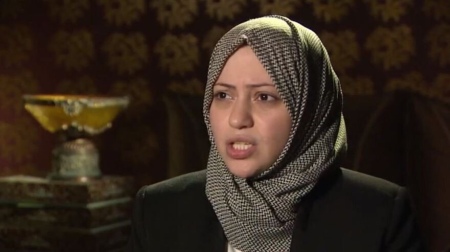 a) Samar Badawi was born on 28 June 1981 in Saudi Arabia. She has a long history of fighting for women’s rights against her father and against the Saudi Arabian authorities.
a) Samar Badawi was born on 28 June 1981 in Saudi Arabia. She has a long history of fighting for women’s rights against her father and against the Saudi Arabian authorities.
Samar Badawi was married to the human rights lawyer Waleed Abulkhair and she is Raif Badawi‘s sister.
b) Samar Badawi’s father had abused her for years. In March 2008 she decided to endure the constant abuse not any longer and fled to the Protection Home in Jeddah, a shelter for victims of physical abuse.
However, things are complicated in Saudi Arabia. No women is free to make decisions for herself. Every woman has a male guardian who decides among other things where she is allowed to live. The guardian is usually the father or husband of the women, but it can also be her brother, her uncle or even her son. Samar Badawi left her home against her father’s wishes. Therefore he filed a charge of “disobedience” against her. However, the public prosecutor and the courts decided to drop the charges.
In 2009 her father sued again for “disobedience”. This time Jeddah’s Summary Court president, Judge Abdullah al-‘Uthaim, issued an arrest warrant against her, because she missed some court hearing. The judge justified his decision quoting the Interior Ministry decree 1900 and said “disobedience is among the serious cases requiring imprisonment”. Human Rights Watch argues that there is no basis for this statement in the decree. Samar left the shelter in July 2009 to live with her brother. She hoped that this would protect her against further abuse and imprisonment.
In 2010 she wanted to marry Waleed Abulkhair, a human rights lawyer, who had also acted on her behalf in court. Under the male guardianship rules she needed the consent of her father as her guardian to get married. He was not prepared to give his consent and Samar filed a so called “Adhl” case against her father, requesting to remove her father’s status as her guardian. She went to a hearing in this case on 4 April 2010 and was arrested based on an open “disobedience” warrant. Samar Badawi spent more than six months in prison and was finally released on 25 October 2010. An uncle of Samar became her guardian.
You can read more details about these court cases in an article by Human Rights Watch: “Saudi Arabia: Where Fathers Rule and Courts Oblige“. The article also the cases of two other women.
c) Samar Badawi also started legal actions to ensure women’s right to vote. Traditionally women in Saudi Arabia were not allowed to vote and were not able to stand for office. In September 2011 King Abdullah changed this and granted women the active and passive voting right. There were municipal elections in September 2011, but women were not allowed to exercise their right to vote. The government explained their refusal with “logistical difficulties”. Samar did not think there was any basis in law to deny women their right to vote. She filed a lawsuit in the Grievance Board against the Ministry of Municipal and Rural affairs, because of their refusal to register her as voter in the voter registration centre. She argued that there was no law against her registration and based her claim on Art. 3 and 24 of the Arab Charter for Human Rights. The Grievance Board accepted her cases in 27 April 2011, but then decided that her case was “premature”.
Her courageous actions were internationally acknowledged on 8 March 2012 when she was awarded with the 2012 International Women of Courage Award by the United States Department of State. They said about her:
“Badawi was the first woman to sue her father for abusing the guardian system and preventing her from marrying the suitor of her choice. She is also the first woman to file a lawsuit against the government demanding the right for women to vote, and launched an online campaign to encourage other women to file similar suits. The efforts of activists like Badawi helped encourage a royal decree allowing women to vote and run for office in future municipal elections.”
d) In 2011 and 2012 Samar Bawadi joined the Women’s Driving Campaign. According to ADHRB there was never an official law which banned women from driving. However in the early 1990s the Council of Senior Religious Scholars issued a fatwa on the subject which argued that women who drive lead to “evil and negative consequences” . Therefore driving for women was forbidden. Women had been protesting against the driving ban since 1990. In 2011 Manal al-Sharif started on Facebook the campaign Women2Drive and encouraged women to defy the driving ban. Samar Badawi drove regularly from June 2011 onward and helped other women when they were arrested by the police or faced court proceedings of defying the driving ban.
In 2012 she filed charges in the Eastern Provinces Grievance Board against the General Directorate of Traffic, because they had rejected her application for a driving license. Samar argued that there is no legal basis for this rejection. She was the second women to do this after Manal al-Sharif who had filed an objection with the General Directorate of Traffic in Riyadh on 15 November 2011.
e) On 19 September 2014 Samar Badawi participated in a side event at the 27th session of the United Nations Human Rights Council titled “Human Rights Violations in Saudi Arabia“. She spoke at this event about the case of her then husband Waleed Abulkhair who had been sentenced to 15 years in prison and a 15 year travel ban once he is released for his advocacy for human rights in Saudi Arabia. Two days later she meet with the High Commissioner of Human Rights in Geneva. On 20 September 2014 she travelled to the USA to meet US senators and secretaries of state to discuss the situation of human rights defenders, in particular of Waleed Abulkhair.
On 2 December 2014 she went to the airport in Jeddah and wanted to fly to Brussels to participate in a Human Rights Forum organised by the European Union. Samar was informed that the Ministry of Interior had issued a travel ban against her for an indefinite period of time. No reasons were given for this travel ban, but it is likely that her advocacy work at the UN and in the USA in September 2014 played an important part in the decision to ban her from further travelling.
f) Samar Badawi had been several times the target of arbitrary arrests, interrogations and harassment, in particular in 2016 and 2017. She was arrested on 12 January 2016 in connection with her human rights activism. She had been summoned on 7 January 2016. When she arrived with her two year old daughter Joud she was interrogated for 4 hours. The police questioned her in particular in the context of her activism for Waleed Abulkhair and about managing his twitter account. The next day she was released on bail.
On 13 February 2017 she was again summoned for questioning on 15 February 2017. There was no specific reason disclosed to her. She was again interrogated for several hours. She tweeted afterwards that the interrogation was connected with her human rights activism.
g) About two weeks ago, on 30 July 2018 security forces arrested Samar Badawi. Her whereabouts or the reasons for her arrest are unknown.
2. Nassima al-Sadah
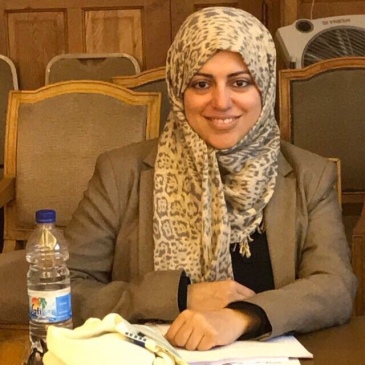 a) Nassima al-Sadah is a longstanding activist for women’s rights in Saudi Arabia. She comes from the Eastern Provinces of Saudi Arabia. Nassima was a co-founding member of the human rights organisation Al-Adalah Centre which did not receive a permission to work as a human rights organisations.
a) Nassima al-Sadah is a longstanding activist for women’s rights in Saudi Arabia. She comes from the Eastern Provinces of Saudi Arabia. Nassima was a co-founding member of the human rights organisation Al-Adalah Centre which did not receive a permission to work as a human rights organisations.
b) Nassima al-Sadah was involved in 2011 and 2012 the Women’s Driving Campaign Women2Drive. She joined Manal al-Sharif and Samar Badawi and filed in 2012 a claim against the traffic department of the interior ministry at the Dammam court in Eastern Province, because they refused to issue a driving license to her. She had applied repeatedly for a driving license. She was the third woman who had filed such a claim in court.
c) The municipal elections on 12 December 2015 were the first elections in which women had the active and passive voting right. There were 2106 open seats in 284 municipal councils. The municipal council has no influence on national politics and only limited authority over local affairs. Over 900 women registered as candidates for a seat in one of the councils. There were 4.5 million eligible female voters, but only 132,000 registered to vote. ADHRB explained that there were significant obstacles for women to get registered. One problem was there was only a three week window to get registered. Because of the guardianship system and the ban on driving, many women were unable to get to the registration centre to register.
Nassima al-Sadagh was one of the women who declared her candidacy for a municipal council seat. She also set up a campaign committee and held workshops to encourage women to get involved and get registered. One of the reasons she gave for her candidacy was the following:
“Men have to know that women must sit beside them in every decision-making and that their voices should be heard.”
There were also restrictions for women who stood as candidates, because they were not allowed to address men themselves and had to use a male spokesman to address men. About two weeks before the elections, Nassima was informed that she was disqualified as a candidate. The authorities gave no reason for her disqualification.
d) On 30 July 2018 security forces arrested Nassima al-Sadagh. Also in her case, no reasons were given for the her arrest and her whereabouts are unknown.
II. Arrested in May 2018: Aziza al-Yousef, Eman al-Nafjan and Loujain al-Hathloul
On 19 May 2018 the Saudi Press Agency reported that seven individuals have been arrested for their “suspicious contact with foreign entities”, “recruiting people working in sensitive government positions” and “providing financial support to hostile entities abroad with the aim of undermining the security and stability of the Kingdom, and shaking the country’s social fabric”. Amnesty International think that this statement refers i.a. to three women rights defender and two other human rights defenders. The women are Aziza al-Yousef, Eman al-Nafjan and Loujain al-Hathloul. All three are still in detention and are held at an unknown location.
1. Aziza al-Yousef
a) Aziza al-Yousef is a Saudi academic and a women rights defender. Aziza is in her sixties. As a young girl she studied at King Saud University in Riyadh, Saudi Arabia, for one semester. She moved then to the United States, where she studied at Virginia Commonwealth University. She gained in the USA a bachelor’s degree in computer science and then completed her master’s degree at the King Saud University.
Azizia is mother of four sons and one daughter and had been a professor of computer science at King Saud University for 28 years. She is now retired. She has also for years helped women who fled abusive marriages and homes.
b) Aziza al-Yousef has been campaigning for years for an end of the male guardianship. In an interview with Rob L. Wagner, she explained that she hopes that the economic circumstances will result in greater freedom for women. The government wants to increase women’s employment from 22% to 30% by 2030. It is difficult to achieve this goal with the strict guardianship rules. She said:
“We are used to 26 years of making demands. There is nothing we can do but to continue this thing. I hope the government treats this as an economic situation and we hope to get more allies. We have a young population with 50% under the age of 26. It’s time to listen.”
In September 2016 Aziza al-Yousef was one of the supporters of a petition to King Salman to abolish the male guardianship. According to an article in the Guardian there were 2,500 women who sent telegrams to the office of King Salman to urge him to end the guardianship system. The petition itself gained about 14,700 signatories. The hashtag #IAmMyOwnGuardian spread awareness about the campaign.
Aziza al-Yousef explains in the above mentioned interview that she sees in the strict guardianship system more a tradition in Saudi Arabia which evolved in the last three decades than an obligation in Islam. She explains that there is no rule in Islam which prohibits a women to work or to study.
“Islam does not say that women should not work or study but that she is responsible for her own actions and if she has a debt, she is responsible for that debt.”
Aziza al-Yousef delivered the petition on 26 September 2016 to the Royal Court. As far as I am aware there was no reaction to the petition.
c) Aziza al-Yousef advocated for lifting the driving ban on women for a long time and was also detained several times, because she drove in Saudi Arabia.
She was one of the key organisers of women driving campaign in October 2013. The campaign called on women to drive on 26 October 2013. There was a lot of opposition to this action. In the weeks before the 26 October a leading Saudi cleric gave an interview and warned that women who would drive cars will damage their ovaries. Two days before the campaign date the Ministry of Interior issued a warning and told women to stay off the roads. Nevertheless, the organiser were able to post several films of women who had defied the driving ban and it was one of the most successful and widely supported campaigns. A few weeks after the campaign date Aziza Al-Yousef had an audience with the Interior Minister, Prince Mohammed bin Nayef, via teleconference. She emphasised in this conference the desire of many women and men to end the driving ban for women.
In December 2013 she was again arrested when she drove in Riyadh. Her passenger Eman al-Nafjan (see the next chapter) was also arrested. Both were released after a few hours in the custody of their husbands. The husbands were asked to sign a statement that their wives would not drive again. Aziza al-Yousef’s husband signed the statement, but also asked the authorities who demanded this pledge from him: “How can I do that? I can’t prevent her from driving. Only God can do that.”
d) Aziza al-Yousef was among the activists who were arrested between the 15 and 18 May 2018. There is no information about the reasons for her arrest or her current whereabouts.
2. Eman al-Nafjan
 a) Eman al-Nafjan is a women rights activist and blogger from Saudi Arabia. Eman used to work as school teacher. She earned a master degree in Teaching English as foreign language at University of Birmingham. She is an assistant professor of linguistics at a university in Riyadh. Eman is married and mother of four children. Foreign Policy named her in 2011 as one of the TOP 100 Global Thinkers.
a) Eman al-Nafjan is a women rights activist and blogger from Saudi Arabia. Eman used to work as school teacher. She earned a master degree in Teaching English as foreign language at University of Birmingham. She is an assistant professor of linguistics at a university in Riyadh. Eman is married and mother of four children. Foreign Policy named her in 2011 as one of the TOP 100 Global Thinkers.
b) Eman al-Nafjan started her blog “Saudiwomen” in February 2008. It is a blog in English. She writes about a wide range of topics, in particular social and political topics in Saudi Arabia and about women’s rights. Her latest blog posts are about a book by Manal al-Sharif: Daring to Drive and “Change can happen in Saudi Arabia“. Eman al Nafjan also wrote articles in 2011 and 2012 which were published in the Guardian. She also contributed opinion pieces to other newspapers like CNN, Foreign Policy and Newsweek.
c) In 2011 Eman al-Nafjan participated in the Women2Drive campaign and wrote several articles about the campaign and its background, i.a. for the Guardian. For the women driving campaign on 26 October 2013, Eman al-Nafjan was a key figure who mobilised many women and community figures alike. She also drove publicly in Riyadh during this campaign. You can find one of her blog post on the Amnesty International website about the 26 October driving campaign. Eman describes in her post the long history of campaigning against driving ban and explains that there were specific proposals to abolish the ban which were sent to the Shura Council by Dr Mohammad al-Zulfa in 2006 and another by Abdullah al-Alami in 2012. However they were not discussed in public. Also Eman emphasises in her post that there is no religious basis for ban, but that it is rather “socially maintained”.
Eman al-Nafjan was arrested in December 2013 when she was a passenger in a car which was driven by Aziza al-Yousef. As Aziza, Eman was questioned and released after a few hours in the custody of her husband.
In September 2016 Eman al-Nafjan was a signatory and one of the advocates for the petition to King Salman to abolish the male guardianship system.
d) According to Gulf Centre for Human Rights Eman al-Nafjan was arrested on 17 May 2018. She was allowed to call her family once, but there is no information about the reasons for her arrest or her whereabouts.
3. Loujain al-Hathloul
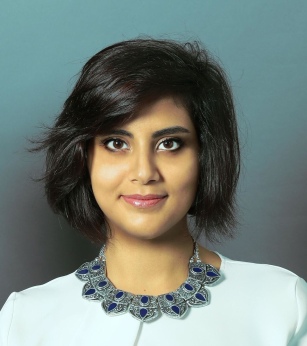
a) Loujain al-Hathloul is a Saudi women rights activist. Loujain was born on 31 July 1989. Her family comes from Qassim, a region at the heart of Saudi Arabia. Qassim is a very conservative region, but Loujain’s family is relatively liberal. Loujain lived as child several years in France. In 2015 Loujain al-Hathloul was named as the third most powerful Arab Women by the newspaper Arabian Business. She was also a participant of 2015 One Young World.
b) Loujain al-Hathloul explained in an interview with FT how she started being a campaigner for women’s rights. In 2012 she discovered a new app which was called Keek. Keek allowed its user to make 30 second videos which could be shared with others. Loujain was at at time studying French literature at the University of British Columbia in Vancouver. She was curious what Saudis uploaded. She was struck by one video of a women who said “Saudi women are stripped of their identity”. Loujain decided to make her own videos, showing herself with her hair uncovered and arguing for liberation of women, in particular by allowing women to drive. Her social media presence quickly grow and campaigners for Women2Drive got in contact with Loujain. She joined the campaign and one of her videos reached 30 million views.
c) On 21 October 2013 she came back to Saudi Arabia. Her father picked her up at the airport and gave her the key and asked her to drive the car. He also made a video which she shared. Loujain was disappointed that there was no reaction to her action, but her father was summoned and was asked to pledge that his daughter would not use the car in the future.
Loujain al Hathloul had a driving licence from Abu Dhabi which she got when she worked there. This driving licence was officially valid in all six GCC countries. Loujain decided to challenge the Saudi authorities. She drove her car to the Saudi border and wanted to enter with her car on 29 November 2013. Initially the authorities were unsure what to do with her and held her at the border for 26 hours. She was then told that she had two options: to head back or to face arrest. Loujain decided not to return to the Emirates. She spent 73 days in a prison in the Eastern province and the courts argued whether she should be charge under the terrorism laws for undermining the national security. She was then released but only after she was prepared to sign a pledge not to speak out about women’s driving. She only accepted with a qualification – she would not make any new videos, but did not accept a restriction to her activities on Twitter.
d) Loujain al-Hathloul not only campaigns against the driving ban for women in Saudi Arabia, but also for political rights and for the abolition of the male guardianship.
At the municipal elections on 12 December 2015 she decided to stand as on of the candidates. She explained that she want “to increase the percentage of women’s participation”. However her candidacy met the same fate as Nassima al-Sadah’s candidacy. Also Loujain’s name was struck from the list and no reasons were given for her disqualification.
In September 2016 she signed a petition to King Salman asking him to abolish the male guardianship. The petition was very popular and got more that 14,0000 signatures. Loujain al-Hathloul publicly advocated for the petition.
On 4 June 2017 she was arrested at the at King Fahad International Airport in Dammam and interrogated. A few days later on 7 June 2017 she was released without further charges.
e) About three months ago, on 15 May 2018 Loujain al-Hathloul was arrested again. This time the security forces came to her house. She has been held incommunicado since her arrest and it is unclear why she was arrested. She is still in detention.
III. Please campaign for Saudi women rights defenders
Since 24 June 2018 women in Saudi Arabia are allowed to drive, but those women who were instrumental in campaigning for the abolition of the driving ban are in prison.
As always, I would like to ask you to raise awareness for Samar Badawi, Nassima al-Sadagh, Aziza al-Yousef, Eman al-Nafjan and Loujain al-Hathoul. All five are astonishing women and their stories are worth to be heard.
In May a Saudi newspaper tried to discredit Aziza al-Yousef, Eman al-Nafjan and Loujain al-Hathoul and other human rights defenders who were arrested by calling them “traitors”. They mentioned that the activists formed a “cell” and posed a threat to state security for their “contact with foreign entities with the aim of undermining the country’s stability and social fabric“.
Saudi Arabia is very concerned about their public image. The crown prince Mohammad bin Salman bin Abdulaziz Al Saud spent a lot of time during the past months to tour different Western countries and try to sell his ideas about reform and a “new Saudi Arabia”. Saudi Arabia reacted to criticism after the arrest of the women rights defenders in a quite drastic way.
After the arrest of Samar Badawi and Nassima al-Sadagh the Canadian foreign office sent the following tweet:
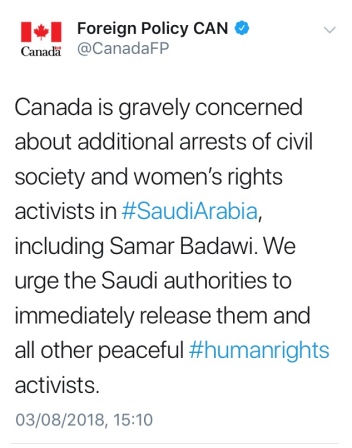
As reaction to the tweet Saudi Arabia denounced the statement as a “blatant interference in the Kingdom’s domestic affairs, against basic international norms and all international protocols”. They expelled the Canadian ambassador and announced that they will “hold all new business and investment transactions with Canada”.
I think we should stand with Canada and make sure that the stories of these women stay in the public conscience. Please consider writing to the foreign office of your country and urge them to speak up for the arrested women rights defenders.
You can also tweet about the five women. All five women use social media themselves. Their Twitter handles are: Samar Badawi @samarbadawi15, Nassima al-Sadagh @nasema33, Aziza al-Yousef @azizayousef, Eman al-Nafjan @saudiwoman and Loujain al-Hathoul @LoujainHathloul. You can use as hashtags #FreeSamar, #FreeNassima, #FreeEman, #FreeAziza and #FreeLoujain.
Amnesty International UK started an online petition “Free Saudi women who fought for the right to drive“. Please sign and share this petition.
Amnesty International also issued an urgent action in May after the arrest of Aziza al-Yousef, Eman al-Nafjan and Loujain al-Hathoul. Even so the date for his action has past, you can certainly still write to the Saudi authorities on behalf of all five women and ask for their release.
I included links to quite a number of articles in my blog post. I want to recommend in particular the following articles and reports, if you want to know more about the human rights defenders and about women’s rights in Saudi Arabia in general.
- Report “Hollow Words, Empty Reforms: Saudi Arabia’s Effective Refusal to Reform Women’s Rights” by ADHRB (Americans for Democracy & Human Rights in Bahrain)
- Human Rights Watch website “End Male Guardianship” with video clips and a lot of further information
- Human Rights Watch report “Boxed In. Women and Saudi Arabia’s Male Guardianship System“
- A conversation with Saudi women’s rights advocate Aziza al-Yousef, Arab Weekly, 6 November 2016
- Eman al-Nafjan’s blog “Saudiwomen“
Let us hope that the five women will soon be released and that a true Arab Spring will happen in Saudi Arabia.
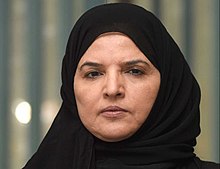
thanks for this. I’ve put something on Facebook too. Really strong stuff
LikeLiked by 1 person
Yes, please do so. I think all five are quite amazing women.
LikeLike
[…] Source: Where are the Saudi reforms? Saudi women rights defenders Samar Badawi, Nassima al-Sadah, Loujain al… […]
LikeLike
[…] for the first time, Al-Sadah decided to run. Two weeks before the vote, her candidacy was disqualified without any […]
LikeLike
[…] for the first time, Al-Sadah decided to run. Two weeks before the vote, her candidacy was disqualified without any […]
LikeLike
[…] for the first time, Al-Sadah decided to run. Two weeks before the vote, her candidacy was disqualified without any […]
LikeLike
[…] for the first time, Al-Sadah decided to run. Two weeks before the vote, her candidacy was disqualified without any […]
LikeLike
[…] for the first time, Al-Sadah decided to run. Two weeks before the vote, her candidacy was disqualified without any […]
LikeLike
[…] e di partecipare, Al Sadah avevo deciso di candidarsi. Due settimane prima del voto, è stata squalificata senza nessuna […]
LikeLike
[…] besloot Al-Sadah zich kandidaat te stellen. Twee weken voor de verkiezing werd haar kandidatuur gediskwalificeerd zonder enige […]
LikeLike
[…] εβδομάδες πριν από την ψηφοφορία, η υποψηφιότητά της απορρίφθηκε χωρίς […]
LikeLike
[…] My most popular blog post in 2018 was my article about Saudi women rights defenders: “Where are the Saudi reforms? Saudi women rights defenders Samar Badawi, Nassima al-Sadah, Loujain al…“. Saudi Arabia saw in 2018 a crackdown for human rights defenders and there was […]
LikeLike
[…] Al-Sadah ist Mitbegründerin des Al-Adalah Center for Human Rights (etwa: Al-Adalah Zentrum für Menschenrechte), einer Organisation, der die saudi-arabische Regierung die Genehmigung für ihre Arbeit verweigerte. Wie Badawi hat sich auch Al-Sadah für Frauenrechte eingesetzt und wurde bereits hinsichtlich ihres Einsatzes für Menschenrechte verhört. Sie kandidierte bei den Kommunalwahlen 2015, an denen Frauen erstmals teilnehmen durften. Zwei Wochen vor der Wahl wurde sie ohne Begründung von selbiger ausgeschlossen. […]
LikeLike
[…] lifted. Around the same time Saudi Arabia crackdown on human rights activists and in particular on those women who were strong advocates of the right to […]
LikeLike
[…] post about Saudi women rights defenders which I published on 13 August 2018. It is called “Where are the Saudi reforms? Saudi women rights defenders Samar Badawi, Nassima al-Sadah, Loujain al…“. Between May 2018 and end of July 2018 Saudi Arabia arrested 13 women rights defenders. My […]
LikeLike
[…] women rights defenders who were arrested between May and July 2018. I wrote about five of them in blog post in August 2018. There are altogether 13 women rights activist who were initially arrested around this time and […]
LikeLike